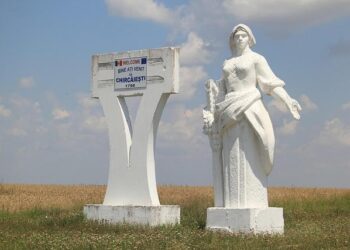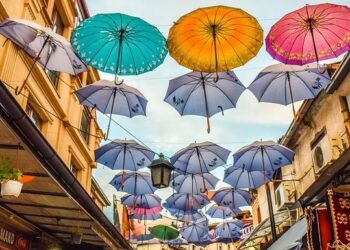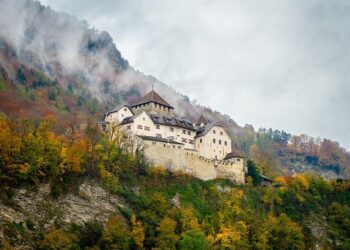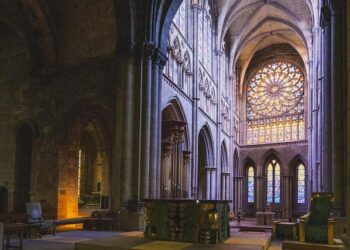Thousands of visitors flocked to a remote village in North Macedonia this weekend to witness a vibrant display of cultural heritage as an old-style wedding ceremony was reenacted in full traditional regalia. The event, drawing locals and tourists alike, highlights the country’s commitment to preserving and celebrating its rich Balkan customs amid rapid modernization. Organizers and participants alike emphasized the significance of living traditions in fostering community identity and passing heritage to future generations.
Living Tradition Revived in North Macedonia Village Wedding Celebration
Nestled deep in the heart of North Macedonia, a remote village has become the epicenter of cultural revival as it hosts an annual wedding celebration that draws thousands from across the Balkans and beyond. This event revives centuries-old matrimonial customs preserved through time, offering visitors a vivid glimpse into a way of life that modernity has largely overshadowed. Attendees witness rituals performed in traditional costumes, accompanied by folk music played on authentic instruments, and a communal feast showcasing local culinary heritage. The wedding procession, marked by rhythmic dances and symbolic customs, not only unites two souls but also weaves the community tighter around shared history and values.
Key elements that distinguish this celebration include:
- Authentic Attire: Handcrafted garments embroidered with intricate patterns unique to the region.
- Music & Dance: Live performances of the kaval and gaida, traditional woodwind instruments, leading spirited group dances.
- Ritual Customs: The bride’s symbolic journey through the village, representing purity and communal blessings.
- Gastronomy: Dishes like ajvar, fresh breads, and goat cheese served as part of the ceremonial feast.
| Element | Description | Symbolism |
|---|---|---|
| Bridal Crown | Silver filigree decorated with beads | Purity and protection from evil |
| Wedding Bread (PogaÄŤa) | Round loaf baked with ornate patterns | Unity and prosperity |
| Kaval Music | Woodwind melodies during procession | Connection to ancestors |
Cultural Significance and Community Impact of Old-Style Nuptials
In the heart of North Macedonia, the revival of old-style weddings has become more than a mere ceremony-it is a potent symbol of cultural preservation and communal pride. These traditional nuptials embody centuries-old rituals, weaving together folklore, music, dance, and attire that resonate deeply with local identity. For many villagers, participating or attending is an act of reconnecting with their heritage, reinforcing bonds across generations. Elders often recount stories of past celebrations, while younger attendees learn firsthand the value of their unique cultural fabric, ensuring the continuity of these vibrant customs in an increasingly globalized world.
The event’s impact extends beyond mere tradition, serving as a catalyst for regional tourism and economic activity. Thousands of visitors flock annually to witness the spectacle, drawn by the authenticity and immersive experience that modern weddings rarely provide. Local businesses benefit from the influx, and celebrants take pride in showcasing North Macedonian hospitality. The ceremony also plays a critical role in community cohesion, as preparation and execution require collective effort, from crafting ornate costumes to organizing shared meals and performances. This unity not only strengthens social ties but also invigorates a shared sense of purpose and belonging.
- Revival of folk music and dance integral to wedding festivities
- Intergenerational participation fosters cultural transmission
- Boost for local economy through tourism and craftsmanship sales
- Strengthening of village communal identity and pride
| Aspect | Community Impact | Visitor Experience |
|---|---|---|
| Traditional Attire | Cultural pride and artisan support | Visual spectacle and authenticity |
| Music & Dance | Preservation of folklore | Engaging cultural immersion |
| Collective Preparation | Enhanced social bonds | Insight into communal life |
| Local Cuisine | Economic benefit for local vendors | Taste of regional specialties |
Preserving Heritage Through Tourism Recommendations and Local Engagement Strategies
Local communities in North Macedonia are harnessing the power of cultural tourism to safeguard their ancestral traditions while boosting the village economy. The revival of the old-style wedding ceremony has become a beacon, drawing thousands of visitors eager to witness a living tapestry of heritage, music, and ritual. By integrating authentic experiences with responsible tourism practices, organizers ensure that these celebrations remain true to their roots, avoiding commercialization pitfalls. Crucially, partnerships with local craftsmen, musicians, and elders are central to maintaining the event’s integrity, promoting both cultural pride and sustainability.
To deepen visitor engagement and foster ongoing community support, several interactive initiatives have been introduced:
- Collaborative Workshops: Hands-on sessions where tourists learn traditional embroidery, dance steps, and folklore storytelling.
- Community-led Tours: Guided walks through historic village sites accompanied by personal anecdotes from residents.
- Local Cuisine Tastings: Featuring heirloom recipes prepared by village families, connecting guests to the cultural palate.
| Strategy | Benefits | Stakeholders |
|---|---|---|
| Traditional Craft Workshops | Skill preservation and tourist interaction | Artisans, Tourists |
| Guided Village History Walks | Enhanced cultural understanding | Elders, Tour Guides |
| Authentic Food Experiences | Economic uplift for local families | Home Cooks, Visitors |
To Wrap It Up
As the echoes of traditional songs fade and the last guests depart, the annual old-style wedding in this North Macedonian village continues to stand as a vibrant testament to the region’s rich cultural heritage. Drawing thousands each year, the event not only preserves age-old customs but also revitalizes local identity in an era of rapid modernization. With every celebration, the living tradition of the Balkan wedding endures, bridging past and present for generations to come.















